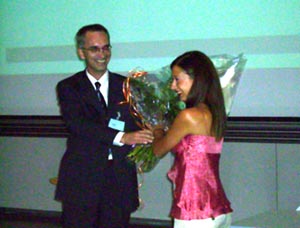- Home
- News
- General News
- ESRF scientists...
ESRF scientists awarded
02-10-2006
ESRF scientists received prizes for their contributions in the fields of X-ray Absorption Fine Structure, Surface Science and Powder Diffraction.
Share
|
Despite the holiday season, ESRF scientists have spent part of the summer working… in conferences. In most of them prizes are awarded to particularly good talks, posters or papers. A scientist and a PhD student from the ESRF have received prizes in recognition of their work. The scientist in charge of ID26, Pieter Glatzel, received the prize Farrel Lytle Young Scientist Award in July in the framework of the 13th International Conference on X-ray Absorption Fine Structure (XAFS13). Glatzel was awarded for "for his contribution in developing XAFS-related techniques such as X-ray emission spectroscopy, resonant and non-resonant X-ray scattering." The award is given by the International XAFS Society, which is the umbrella organization for synchrotron radiation X-ray absorption experiments. Farrel Lytle is one of the pioneers of modern X-ray absorption experiments. He developed the so-called Lytle detector for XAFS experiments. Glatzel had the opportunity to meet him thanks to the prize: "Farrel Lytle is a personality in the XAFS community and his work has contributed enormously in the development of this field. It was a great pleasure to meet him for the first time", he explained. In surface science, Marcelo Ackermann, joint PhD student between ID03 and Leiden University, was awarded a prize at the 24th European Conference on Surface Science (ECOSS), which took place in the beginning of September. He received the prize for the best student paper presented at the conference. There were a total of 100 entries competing for the prize, but only eight papers were selected for an oral presentation. Ackermann presented his results on reaction rate oscillations in CO oxidation on palladium. For his work, he used ID03 and combined it with a high pressure Scanning Tunnelling Microscope (STM). The work on STM was carried out mainly by his colleague from Leiden University Bas Hendriksen. ECOSS brought together 800 scientists and it is the most important event in this field in Europe. In powder diffraction, Irene Margiolaki, scientist from ID31, was awarded the European Powder Diffraction Conference (EPDIC) prize. The award recognises her significant and pioneering contribution to macromolecular powder diffraction. The conference EPDIC-10 took place in Geneva 1-4 September 2006, where she received the prize. She then gave a plenary lecture at the conference describing (some of) the work for which the award was in recognition. |
|
 |
|
Irene Margiolaki being congratulated at the European Powder Diffraction Conference. |
Top image: Pieter Glatzel




